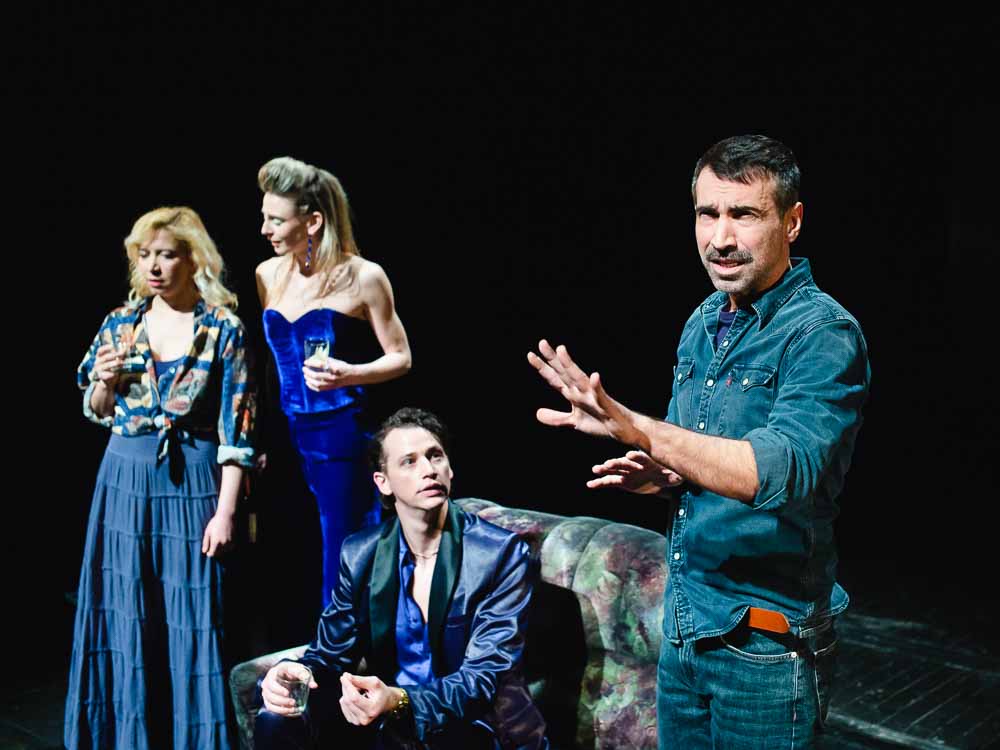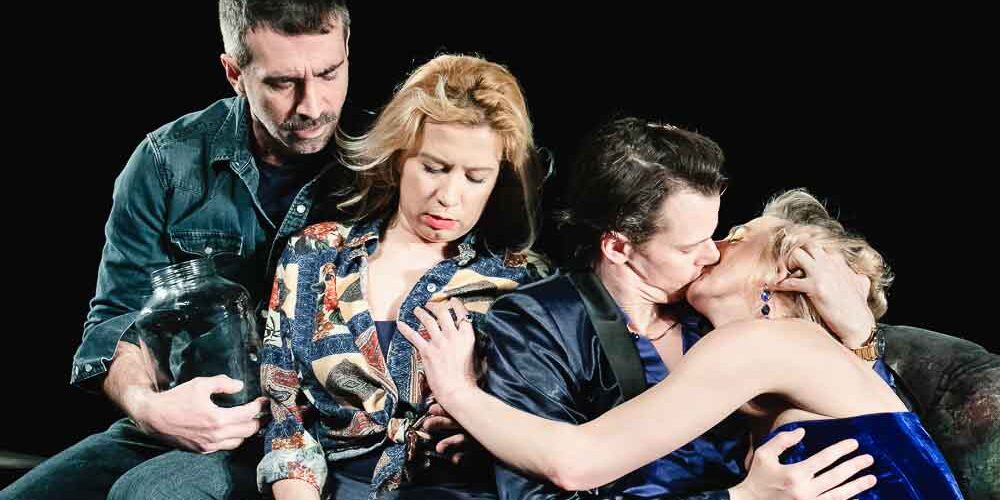Zagreb Youth Theatre, premiere 1st April 2023
‘A whole spectre of emotion, ladies and gentlemen.’ This is a direct quote from My Husband which is used to describe all the different scenes. It can also be said about the play as a whole. This performance is like an emotional rollercoaster. At times, while watching it, one feels an uncontrollable shift in emotions, sensations which change so quickly that it feels dizzying.
Moj Muž (My Husband) is based on the literary works of Macedonian writer Rumena Bužarovska, best known for her short story collections including My Husband (2014) and I’m Not Going Anywhere (2018). My Husband has already been staged in Skopje, Ljubljana, Belgrade, and Budapest; now also in Zagreb. There’s obviously an interest in her writing and topics she covers in her stories which are characterised as ‘critical of today’s society complemented with harsh satire’, by Tomislav Zajec, the dramaturg of ZKM’s stage adaptation.
This version consists of seven stories from Bužarovska’s two collections: The Soup, Genes, Adulterer, Man of Habit and Lile from the My Husband, and The Vase and The 8th March from the I’m Not Going Anywhere. All of the stories focus on the everyday lives of women, their experience in today’s society, specifically in the Balkan region which is still very much patriarchal and conservative when it comes to the roles and expectations it has for women. Those roles are of a wife, who is loyal and obedient to her husband, and a mother who never fails in raising and taking care of her children. Bužarovska writes about the hardships women face during their life while playing these ‘roles’; having an affair or being cheated on (which can sometimes result in a public scandal), infertility and the deaths of loved ones, be it her husband or her children.
Directed by Dora Ruždjak Podolski, this two-and-a-half-hour adaptation of My Husband is divided in two parts which vary in tone – the first part features more humorous and light-hearted stories, whereas during the second half the atmosphere slowly slides towards tragedy, despair and defeat. The scenography is interesting – there’s a giant black triangular construction (designed by Stefano Katunar) which has multiple functions, dividing the stage into different places of action that allows for smooth scene changes with the help of somewhat dramatic, heavily shadowed lighting design(Aleksandar Čavlek and Anton Modrušan) and music (Stanislav Kovačić).
The construction resembles a ship’s stem or, perhaps, a compass needle as it turns during scene changes. However, because of its size and central position on the stage, it can disrupt the actors’ movement, sometimes even hiding them from view from some of the audience. The rest of the stage is in darkness so the scenes take place in the proscenium as no depth can be utilised due to the triangle construction.
The stories are performed as a part of a meet-and-greet event hosted by Kelly Davies (Iva Kraljević), the US ambassador’s wife in Zagreb, who has, for this occasion, with the help of talented women, prepared a performance programme to present an ‘international community of strong women‘. In the play, her character represents a form of cheap, blatant and commercially-friendly feminism which is particularly evident towards the end when she performs a Maya Angelou poem Still I rise in her broken (Serbo-)Croatian translation (part of the joke is that she lived in Belgrade before so she tries to speak ‘pure’ Croatian with a thick American accent).

My Husband at ZKM
The meet-and-greet event is used as the main dramaturgical frame for linking the rest of the stories. This is where it gets messy. Individually, the scenes are well staged and performed, the rhythm and gradation between them is good until, almost out of the blue, Davies reminds us that these are performances within a performance. During the majority of its duration, the play doesn’t insist on this meta aspect, in fact towards the end it’s easily forgotten so its re-emergence seems a bit off. Consequently, it’s not always clear which scenes are a part of the inner performance and which share the same ontological reality. As the scenes play out, they all seem to be somehow connected through the re-appearance of same characters from other stories.
More then half of ZKM’s ensemble takes part in the show, about twenty of them and most of them play a single character. Genes was one of the stories that worked best – Pjer Meničanin, as Neno, a little boy, is a scene stealer, and you can tell he really enjoys playing his character of a child. Genes explores the stereotypes that are bestowed on different nationalities, what characteristics a child can take from their parents genes and how family violence affects children much more than one might think. Milica Manojlović and Dado Ćosić play Neno’s parents Morana and Krešo. The dynamic between them is well-performed, especially when Borka (Mia Melcher), Krešo’s sister arrives as a proud pure-bred Croat. Nataša Dangubić as Maša, minister’s wife, whose scandalous affair will affect her husband’s political position, give a marvellously energetic performance as a raging woman who is tired of her boring husband and wants her lover, the actor Milan (also played by Dado Ćosić), to give her all his attention. So much so that she beats his new young mistress, an acting student.
Towards the end, the stories become more depressing. This culminates with the story of Lile (wonderful Doris Šarić Kukuljica), a two year girl who has tragically died due to an accident caused by her mother Ana (Anđela Ramljak). This scene makes for an apt ending to a long, often tiresome voyage through women’s hardships, losing a child being the most painful thing a mother can possibly face. Yet, this is not where it ends. The final scene The Soup portrays a mother-daughter relationship where the latter has recently lost her husband while she was secretly having an affair and now feels guilty. These two character are actually the first ones to emerge on the stage before Davies’ intrerupts and welcomes the audience to her meet-and-greet event. This final story could have easily been cut out. Neithr Barbara Prpić as daughter Ema nor Nadežda Perišić Radović as her Mother are overly convincing. Ema’s aggression and irritation towards her mother simply feels unreasonable and too much, despite the grief she feels.
At the end, all of the actresses start to puke, displaying the nausea which has accumulated during all the different struggles they have faced on stage. This is an effective scene, but again, it seems so sudden, so abrupt. The Mother (Perišić Radović) calls for all of the women to go back to the kitchen and eat chicken noodle soup. Shortly, the men join them and the women warmly welcome them to join in.
So, after everything we have seen, after all the difficulties and uneasiness the women have portrayed, they get sick, go back to kitchen, eat soup together with their lousy men who, during the play, have shown nothing but contempt for them. They all stay in the same place from which they tried to get away from, which was suffocating them, harming them, to the point it literally made them sick to their stomach. They stay silent and endure. They continue to do the very thing they were sick of doing in the first place.
Credits:
Text: Rumena Bužarovska and Tomislav Zajec//Director: Dora Ruždjak Podolski//Scenography: Stefano Katunar//Costume: Marta Žegura//Sound: Stanislav Kovačić
For tickets and further information, visit: ZeKaEm.hr
Further reading: review of Light Falls at ZKM
Nora Čulić Matošić (1998) is a student of Comparative Literature (MA) at the Faculty of Humanities and Social Sciences in Zagreb. She has written theatre criticism for the Croatian radio programme Theatralia and web portal Kulturpunkt.hr. Besides theatre, her interests are other forms of performing arts (particularly dance performances) and film.








